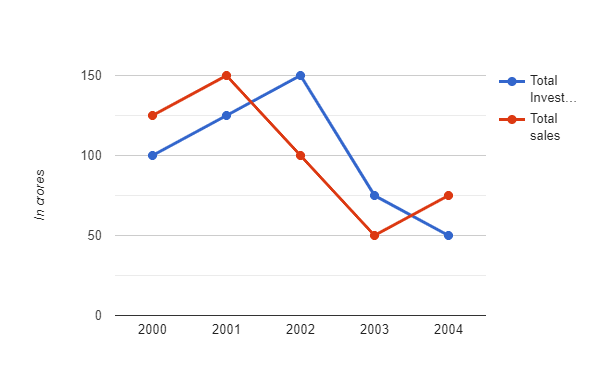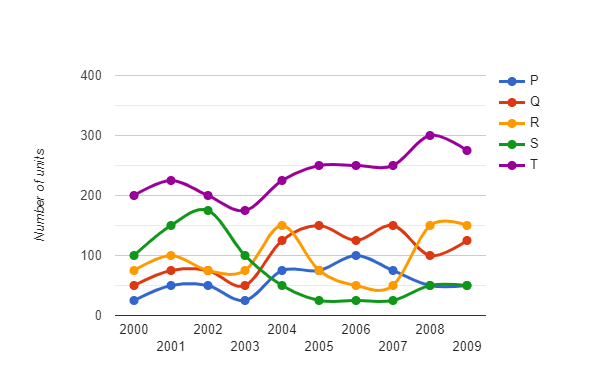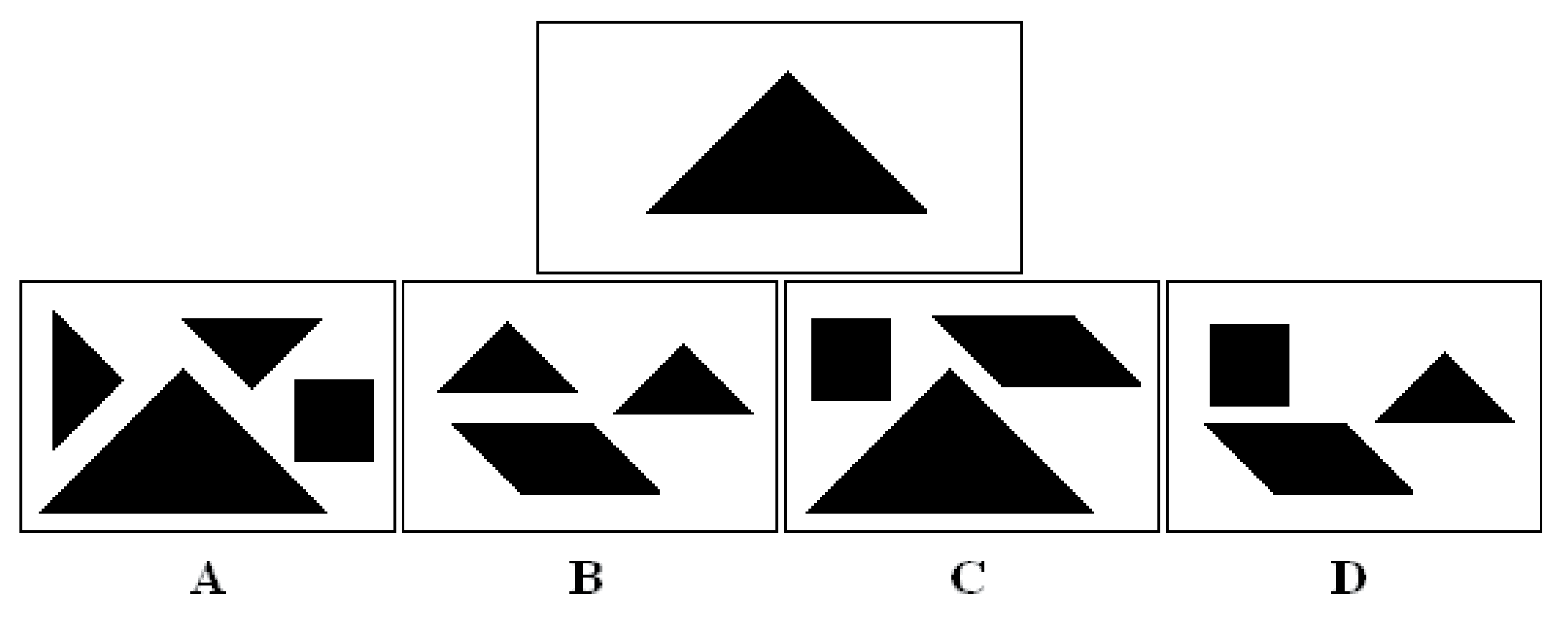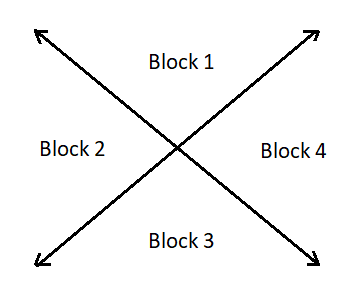| | Medium Dividends | 3 mins Data Interpretation | Solve |
Consider the following line chart which shows the money invested by a company in production each year and the sales made by the company each year. If the pie chart shows the shareholding pattern of the company and the company gives 10% of the profit as dividends to its share holders then what is the average dividend received by retail investors from 2000 to 2004?
|
| | Medium Laptop Brands | 2 mins Data Interpretation | Solve |
Given below is the list of laptop brands and their details in which some data is missing. If the cost price of Dell is 3/5 of the cost price of Lenovo, then what will be the %profit of Dell?
|
| | Hard Median | 3 mins Data Interpretation | Solve |
Consider the following line chart which shows the sales of five different companies from 2000 to 2009. Which of the following companies has the maximum percentage increase in the median from 2000 to 2004 and 2005 to 2009.
|
| | Medium Increasing monthly gross profit | 2 mins Numerical Reasoning | Solve |
The CEO of Snipr. Inc wants to grow monthly gross profit by 4%. If costs stay the same, what does the sales turnover need to be in February to achieve this goal?
|
| | Hard Magic bag | 3 mins Numerical Reasoning | Solve |
Alex’s uncle is a magician who gave them a magic bag in which coins get doubled each time you put those coins into it. Initially, Alex had few coins with them. So, Alex put all the coins, and the coins got doubled. Alex took out all the coins and gave a few to their friend and then again put the remaining coins back in the bag. The coins doubled again; Alex took out all the coins again and gave a few coins to their second friend. Alex then put the remaining coins in the bag and the coins doubled again. Alex took out all the coins and gave a few coins to their third friend.
There were no coins left with Alex when Alex gave coins to the third friend and Alex gave an equal number of coins to each friend. What is the minimum number of coins Alex had initially and how much did Alex give to each friend?
A: Started with 3 coins
B: Started with 5 coins
C: Started with 6 coins
D: Started with 7 coins
E: Started with 9 coins
F: Gave 3 coins in every turn
G: Gave 4 coins in every turn
H: Gave 5 coins in every turn
I: Gave 7 coins in every turn
J: Gave 8 coins in every turn
K: Gave 9 coins in every turn
|
| | Medium Three Clocks | 3 mins Numerical Reasoning | Solve |
In my house, there are three clocks of different shapes – a round clock, a square clock, and a rhombus clock. The rhombus clock is always accurate whereas the round clock gains 2 minutes every day and the square clock loses 2 minutes every day. I checked the clocks on July 22nd, 2007 at 10 PM, and they were showing different times.
Two hours later, when I checked, the clocks were showing the same time, then on which date will all three clocks show the same time again?
A: 17 July 2008
B: 23 Sep 2007
C: 25 July 2009
D: 19 Aug 2008
E: 26 July 2008
F: 28 Nov 2007
G: 11 June 2008
H: 15 Aug 2007
|
| | Easy Assemble Triangle | 2 mins Spatial Reasoning | Solve |
Which of the following set of shapes can be assembled to create the shape displayed:
|
| | Easy Odd One Out | 2 mins Spatial Reasoning | Solve |
Shown below is a group of 4 objects, which might be rotated in different directions. One of the 4 objects is different from the other 3 in some way. Can you figure out which one?
|
| | Medium Four Blocks | 2 mins Spatial Reasoning | Solve |
The city has been divided into 4 blocks. Block 1 in the north and Block 4 in the east of the city.
A postman, who delivers the letter in the city is standing at the intersection of the two lines. The postman travels the city in the following order:
1. North-West 20 steps
2. South-West 30 steps
3. South-East 40 steps
4. North-East 50 steps
5. North-West 15 steps
Now, find the location where the postman is standing?
A: Block 3
B: Block 2
C: Block 4
D: Block 1
E: On the line intersecting Block 1 and Block 4
F: On the line intersecting Block 3 and Block 4
|
| | Easy Overseas office | 2 mins Verbal Reasoning | Solve |
Your company recently opened a second office overseas. Some of the people from the original office will be relocating. All the people hired in the last six months will continue working in the original location where they were hired. Which of the following statements can be true regarding employees relocating?
|
| | Medium China manufacturing | 2 mins Verbal Reasoning | Solve |
The cost of manufacturing phones in China is twenty percent lesser than the cost of manufacturing phones in Vietnam. Even after adding shipping fees and import taxes, it is cheaper to import phones from China to Vietnam than to manufacture phones in Vietnam. Which of the following statements is best supported by the given information.
A: The shipping fee from China to Vietnam is more than 20% of the cost of manufacturing a phone in China.
B: The import taxes on a phone imported from China to Vietnam is less than 20% of the cost of manufacturing the phone in China.
C: Importing phones in Vietnam will cut 20% of the manufacturing jobs in Vietnam.
D: It takes 20% more time to manufacture a phone in Vietnam than it does in China.
E: Labour costs in Vietnam are 20% higher than in China.
|
| | Medium Commerical Premises | 2 mins Verbal Reasoning | Solve |
A large real estate company conducted a recent study of their customers. The study was designed to uncover insights regarding the main criteria for choosing to invest in a residential property. A majority of the customers surveyed stated the 'returns profile' was their main priority, followed by 'development potential' and 'stability of income'. 'Portfolio legacy' ranked at the bottom in the list of factors. It was interesting to note that respondents were less likely to have residential holdings that formed part of mixed-use assets i.e. as an add on to commercial investment. One might assume that more investors are proactively investing in residential real estate rather than having incidental exposure via business investments.
Based on the given passage, what can we say about the following statement?
Business owners having commercial premises often have a residential property as part of their portfolio.
|
| | Medium Airline Operators | 2 mins English | Solve |
Four airline operators A, B, C and D operate on a popular route between 2 cities, Rome and Venice in Italy. Airline A wanted to increase the number of seats sold, so they reduced their fares for this route. Airlines B, C, D imitated this move immediately. The general belief is that the volume of air travel between Rome and Venice would increase as a result of this. Which of the following statements, if true, would add trust to the general belief?
A: All 4 airlines see increased profits.
B: Airlines start slashing rates for other routes as well.
C: A study shows that around 80% of air travel in Italy is company sponsored.
D: A study shows that air travellers in Italy are price sensitive.
|
| | Medium Call Gurj Clooners | 2 mins English | Solve |
Folks should call Gurj Clooners if they want to:
|
| | Medium Cigarette taxation regime | 2 mins English | Solve |
Cigarettes account for only 23% of tobacco consumption, and only 16% of 250 million tobacco consumers use cigarettes. However these 16% contribute 85% of the tax revenues to the Exchequer from the tobacco sector. The punitive cigarette taxation regime has kept the tax base narrow, and lowering taxes will expand this base. Which of these best bolsters the conclusion that lowering duties will expand the tax base?
A: The cigarette manufacturers’ association has decided to indulge in aggressive promotion.
B: Cigarette manufacturers are lobbying for a reduction on duties.
C: There is a likelihood that tobacco consumers will shift to cigarette smoking if cigarette prices reduce.
D: An increase in duties on non-cigarette tobacco may lead to a shift in favor of cigarette smoking.
E: There is a likelihood that tobacco consumers will shift to cigarettes if cigarette prices reduce.
F: A decrease in duties on non-cigarette tobacco may lead to more tobacco consumers shifting to cigarettes.
G: Cigarette smokers are becoming increasing aware of associated health risks.
H: Increased health warnings could reduce the tax base.
|
| | Easy Reading Comprehension | 2 mins English | Solve |
This note informs Savannah that:
A: she can purchase new toys at a discounted rate.
B: the toy store has a new collection that she can purchase from now.
C: she can sell her used toys to the store.
D: she can get used and new toys in the ongoing sale at the store.
|






























































